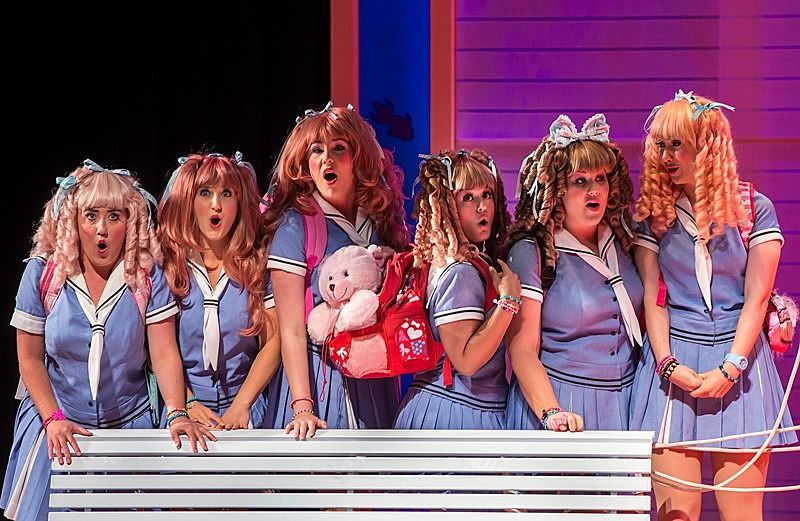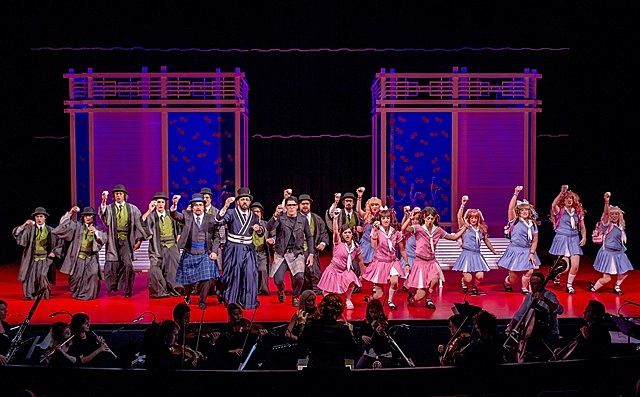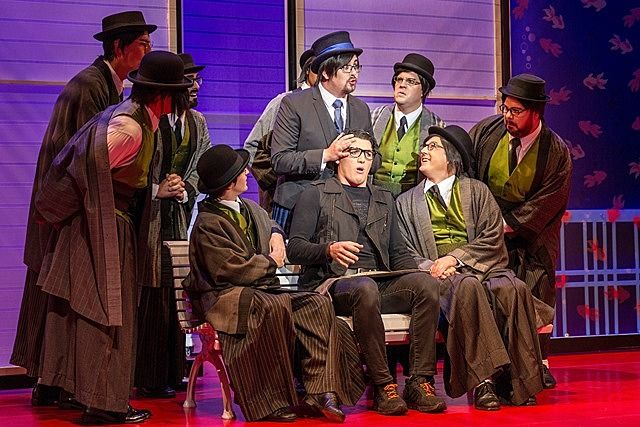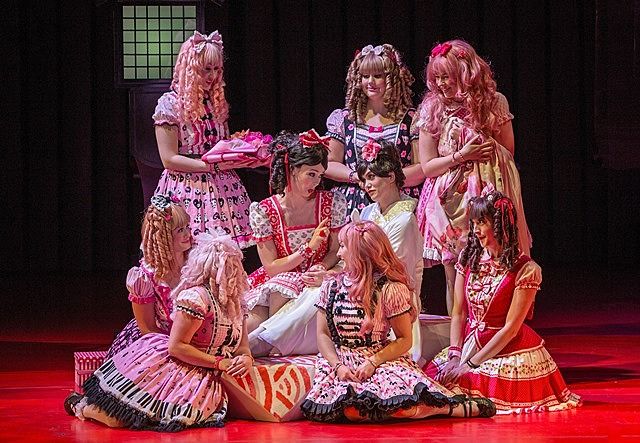Powerful people tied up in knots: a review of 'The Mikado'
Yellowface jeopardises Gilbert and Sullivan’s true legacy
Yellowface jeopardises Gilbert & Sullivan’s true legacy, argues Alex Taylor
New Zealand Opera’s General Director Stuart Maunder – once “Australia’s undisputed G&S king” – is clearly a man on a mission. While the company certainly isn’t neglecting the operatic canon, Maunder is also an advocate for expanding its repertoire into the realms of musical theatre (see: last year’s Sweeney Todd) and light opera. Potentially this is a powerful audience-building strategy; but it’s badly hindered by a certain tone-deafness to the growing critique of racism in the artform.
Enter The Mikado. The aesthetic pleasures of Gilbert and Sullivan are undeniable. The word-play is exquisite, the melodic invention rich, the plotting delightfully perverse – and the entire cast of the current production deserve kudos for bringing these aspects to life. But, as James Wenley intimated before opening night of NZ Opera’s production, these pleasures are not well-served by the operetta’s traditional mise-en-scene, which is a tinderbox of troubles surplus to requirements: racial stereotypes and white people playing minority characters in yellowface. As Wenley feared, Maunder’s production chooses not to eschew these offensive customs, but to merely update them to the twentieth century. Having not seen the show, Wenley’s argument was blunt, but his intuitions were correct.
In contrast to its yellowface presentation, The Mikado provides sharp commentary on subtle abuses of power.
And the impact of this cultural overlording is amplified, as this particular work is perhaps the most popular of a very popular stable of Gilbert and Sullivan operettas, with a devoted – some might say one-eyed – following. (The Auckland season at the new ASB Waterfront Theatre had all but sold out by opening night; in fact it was difficult to secure a ticket for review.) But is The Mikado’s popularity really just down to the wit of the libretto and the cut and thrust of the music? Or is the opportunity to enjoy some (supposedly) guilt-free racial sniggering more enticing than we think?
Yet, in contrast to its yellowface presentation, The Mikado provides sharp commentary on subtle abuses of power. I won’t recount the whole plot here, but at its core, it’s a story of powerful people tying themselves up in knots in order to carry out the letter of the law while still protecting their own interests, and looking very silly in the process. The satire of the operetta is most relevant when it attacks those figures of power, both the literal characters and the tropes they represent in society.
Key among these is the politician of many hats. While “Lord High Executioner” Ko-Ko is (in theory) both judge and axeman for the fictional Japanese town of Titipu, his right-hand man Poo-Bah has been delegated almost every other role imagineable (he’s often known as the Lord-High-Everything-Else), and his advice for Ko-Ko depends entirely on whether he’s acting in the capacity of Private Secretary or as Chancellor of the Exchequer. Sound familiar? While our very own John Key was Prime Minister, he would often claim to have been speaking or acting in his capacity as leader of the National Party, rather than as Prime Minister, if he had said or done something that he really shouldn’t have. His right-hand man, Steven Joyce, was informally dubbed “The Minister for Everything”.
Just as often as this Mikado takes aim upwards at the powerful, it directs derisive laughs downwards at a voiceless minority ‘other’.
The satire is relevant too in lampooning Britain’s stiff-upper-lip sensibility, and tendency towards gross understatement. On hearing that his son Nanki-Poo is dead, the Mikado (Emperor of Japan) is hardly grief-stricken: “this is very tiresome.” Nanki-Poo’s bride-to-be Yum-Yum cheerfully refers to potentially being buried alive as “a stuffy death”.
Another familiar trope up for roasting is the politician’s habit of vote-grabbing by attacking the weak or unlikeable. This is most obvious in Ko-Ko’s famous hit-list “they’d none of them be missed”, which director Maunder reimagines colourfully for twenty-first century New Zealand: this 19th century form turns out to be a potent vessel for contemporary engagement. On the chopping block are fitness fanatics (“fit-bit on his wrist… he can kiss my fist”), musical arch-conservatives (“I’ll make them sit through Liszt”), vibrating cellphones (“vvv vvv”) and the designers who brought us Westfield malls. Was I the only one longing for a Ko-Ko/Ned Stark Game of Thrones reference? (“The man who passes the sentence should swing the sword”).
The biggest laugh of the list came at the mention of a certain “orange-tinted fuhrer” who is “clearly compensating”. It’s admirable that a nineteenth century operetta can engage with contemporary issues not only at an allegorical level, but also at a quite literal one. But when the production remains wilfully blind to political concerns from a position of privilege, the insult rings a little hollow. In this way it’s a remarkably two-faced show: it manages to speak truth to very visible political power with one face, and entrench a much less visible cultural power by smirking with the other.
These are not just passing references, winks and nods at Japanese culture, but deliberate caricatures; cultural appropriation on a large scale (and a sizeable budget).
Firstly, there’s the straight-out stereotype: the women’s chorus are presented as little more than sex-crazed Japanese schoolgirls, complete with pink curly wigs and school uniforms, running around like meerkats. Perfectly packaged bundles of misogyny and racism for our gratification. The constant fawning over anything male, and the intermittent squealing, quickly become cloying. Just because anything Hello Kitty is cute doesn’t make it less offensive.
Then there’s the modified stereotype: a well-drilled men’s chorus, their “attitudes queer and quaint” on full display, are more than a touch campy, with fluttering fans and the odd swoon. Great. But if you dress them in kimonos and oversized glasses, and have them stumble ineffectually across the stage (when they’re not striking sumo poses), you can’t then altogether redeem the caricature by giving them bowler hats and jazz hands. Lipstick on a pig: it’s cute, but it’s still a pig.
When both men and women break out the Aikido, tea ceremony and Japanese song-chant, complete with gongs and pentatonic scales, we realise we haven’t made it out of the nineteenth century alive.
These are not just passing references, winks and nods at Japanese culture, but deliberate caricatures; cultural appropriation on a large scale (and a sizeable budget).
The opening night audience was overwhelmingly white, and wealthy enough to afford a ticket. The actors were white. Where does the power lie here? Just as often as this Mikado takes aim upwards at the powerful, it directs derisive laughs downwards at a voiceless minority ‘other’. It uses the Japanese setting as an excuse for cheap gags.
Librettist W. S. Gilbert once told a journalist, "I cannot give you a good reason for our [...] piece being laid in Japan [except that] it afforded scope for picturesque treatment, scenery and costume.” And the New Zealand Opera production certainly capitalises on that scope for exoticisation.
Stuart Maunder remarked in a NZ Herald interview that Ko-Ko’s famous patter song (the hit-list) “is the one Gilbert and Sullivan number that simply must be updated”. Well, if the list is open to adaption, why is the rest sacrosanct? Why not actually adapt it meaningfully?
The alternative to a yellowface Mikado is not no Mikado at all, but simply a Mikado without yellowface.
There are many opera lovers and critics who say that much of the operatic canon would have to be radically altered, or thrown out altogether, in order to please the so-called “PC brigade”. I take issue with this. The theatre world has successfully held the conversation, and people haven’t stopped performing (for example) Othello or The Merchant of Venice, but they are performed differently today, because society is different, and because performance intersects with society. The way we stage operas in many cases may need to change, heck, some of the material might need to change, or, god forbid, we might need to build an audience for new operas coming through, but we certainly don’t need to be throwing the baby out with the bathwater. The operatic medium is a vital one. And the alternative to a yellowface Mikado is not no Mikado at all, but simply a Mikado without yellowface.
A Mikado without the traditional (orientalising) costuming and makeup isn’t an altogether a new thing. The English National Opera’s 1987 production (with Eric Idle as Ko-Ko) sets the whole thing in England, playing most of the cast as stuffy aristocratic low-key racists. It chimes with Gilbert’s self-aware libretto:
Pooh-Bah: No, of course we couldn’t tell who the gentleman really was.
Pitti-Sing: It wasn’t written on his forehead, you know.
Ko-Ko: It might have been on his pocket-handkerchief, but Japanese don’t use pocket-handkerchiefs! Ha! ha! ha!
As Wenley mentioned, other more recent productions have gone further: the New York Gilbert and Sullivan Players actually cancelled an existing production in order to respond to feedback and make a new production that was sensitive, diverse, and true to the spirit of the original. The San Francisco-based Lamplighters went even further, setting their production in Milan and modifying all reference to Japan in the libretto itself, so that the Mikado became Il Ducato, and the opening chorus became “We are Gentlemen of Milan”.
So it can be done, and increasingly, it is done. G&S is substantial and resilient enough to survive interpretation and adaptation.
Let me be clear. The criticism is not “white people shouldn’t be playing Japanese roles” – because let’s face it, these are not Japanese roles in any meaningful way – although an increase in the company’s diversity and a greater number of prominent roles being given to non-white actors certainly wouldn’t go amiss. (And, furthermore, white people shouldn’t be playing Japanese roles, until there are equally many opportunities for Asian actors to play white roles.) The criticism is that this production (and many other productions) are stuffed to the brim with racist and misogynist stereotypes that are totally redundant to the plot. Superfluous. Unnecessary. In order to protect the aesthetic principles of G&S (fun, wit, and speaking truth to power) it’s my view that those redundant elements have to be acknowledged, and as painful as it is, addressed.*
Underneath all the redundant racism with which they were saddled, the entire cast did well to protect what they could, although space only permits the mention of a few.
Helen Medlyn proves that there’s actually a lot of nuance and depth to Gilbert and Sullivan. It’s not simply racist or misogynistic.
Jonathan Abernethy plays Nanki-Poo as a nerdy heartbreaker with a pinch of swag: think Seymour from Little Shop of Horrors meets Tony from West Side Story. And he makes the best of a potentially embarrassing accident with a plastic dagger. Opposite him, Amelia Berry is burdened with a Yum-Yum even more self-absorbed than usual, but she shines in her solo moments. Abernethy and Berry’s leading couple don’t quite have the timing and chemistry of the outstanding supporting act that follows them, but they do a solid job with relatively two-dimensional characters, and the singing is very good.
The slightly quiet, untrained voice of Byron Coll’s Ko-Ko could hardly be called a weakness; in fact it’s rather charming, especially in combination with his exemplary comic timing, exaggerated physical movements and a Scottish accent (WTF?). He’s like a less sinister, more bewildered version of Joel Grey’s MC in the movie Cabaret. A ringmaster losing control of the circus. Constantly on the brink of a tantrum. He is shadowed by two other lords, and the impending arrival of the Mikado himself. As the haughty Poo-Bah (“I was born sneering”), Andrew Collis is the perfect foil for Coll’s Ko-Ko, his rich baritone dripping with irony. He’s the ultimate yes-man, if you can afford to pay: “choose your fiction and I’ll endorse it.” Although Pish-Tush provides fewer opportunities for mischief than last year’s Signor Pirelli in Sweeney Todd, Robert Tucker adds vocal clarity to the trio of bureaucrats, and throws the absurdity of the other two into relief.
With characteristic versatility, Helen Medlyn proves that there’s actually a lot of nuance and depth to Gilbert and Sullivan. It’s not simply racist or misogynistic. As Katisha, Medlyn is a bloodthirsty predator, but also shows vulnerability; she’s an object of derision, but also offers sage advice. And crucially, she rivals Ko-Ko for a show-stealer; their joint scenes offer a masterclass in (seriously good) melodrama.
The fifteen-piece band – marshalled with flair by conductor Isaac Hayward – features agile bassoon work from Ingrid Hagan, and an impressive pizzicato tone from the compact string section in the relatively unforgiving acoustic of the ASB Waterfront theatre.*
It’s tempting to wax lyrical about the artistry and technique of the production, to divorce them from their context. But for many people it’s not even an option to be in the room, let alone to see the music as separate from its racially charged context. For most it’s a thoroughly uneasy experience.
At the very least New Zealand Opera have a responsibility to acknowledge and respond to the mounting criticism.
When The Mikado was first staged in Japan, the Americans were an occupying force. Hiroshima and Nagasaki had been bombed and the war was over. All the leads in the 1946 production were white – Americans, Canadians, British – while both male and female choruses were Japanese, and the audience was made up of American soldiers. Joseph Raben was serving as an editor of translations at the General Headquarters in Tokyo, and described the show as an “impudent but magnificent gesture, a tribute to [Japanese] culture in a sense, but also an assertion of the Americans' right to do as they pleased in a conquered country.”
New Zealand Opera are quite welcome to stick their fingers in their ears and pretend that nothing needs to change, that the Mikado gesture is only magnificent, and not impudent as well. But as a national company, with large amounts of public funding, in my view they have a responsibility to engage with how race and gender are represented on stage. Or at the very least, acknowledge and respond to the mounting criticism. This is indeed a story of powerful people tying themselves up in knots in order to carry out the letter of the law while still protecting their own interests, and looking very silly in the process.
Photographer credit for all production images: David Rowland
New Zealand Opera's The Mikado
plays in Auckland until 19 February;
then tours to Wellington and Christchurch.





